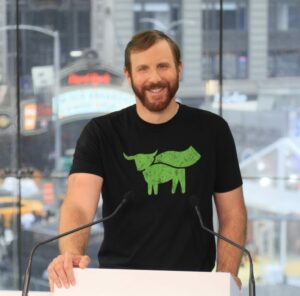Beyond Meat Inc. is having a tough year.
Its stock has lost nearly 90% of its value since closing at a 52-week high of $108.62 about a year ago.
Its chief operating officer left the company 1½ weeks ago after being suspended following allegations that he bit a man on the nose in an altercation after a college football game in Arkansas last month.
And between now and the end of the year, some 200 employees – 19% of the El Segundo company’s global workforce – are being let go.
All the while, the meatless food manufacturer must deal with inflationary pressures and consumer sentiment moving away from its products.
Still, Ethan Brown, the chief executive of Beyond Meat, said that the company continues to make strong progress against the controls of mainstream adoption – taste, health and price – and is advancing key strategic partnerships.

He also had a few words to say about the coming layoffs.
“We believe our decision to reduce personnel and expenses throughout the company, including our leadership group, reflects an appropriate rightsizing of our organization given current economic conditions,” Brown said in a statement in an Oct. 14 statement about the company’s finances.
The company currently estimates that it will incur one-time cash charges of approximately $4 million in connection with the reduction in force, primarily consisting of severance payments, employee benefits and related costs, according to the statement.
Beyond Meat expects that most of these charges will be incurred in the fourth quarter, and that the reduction in force will be substantially complete by the end of the year, the release added.
This follows a reduction of some 40 employees in August, a move that would save the company about $8 million a year excluding one-time separation costs of $1 million which the firm was expecting to record in the third quarter.
In the Oct. 14 release, the company said it was negatively impacted by “ongoing softness in the plant-based meat category overall, especially in the refrigerated subsegment, and by the impact of increased competition.”
Inflation is putting pressure on the food category as consumers “trade down” to cheaper forms of protein, including animal meat, the release said.
“Additionally, the company believes it was negatively impacted by decisions made by distributors and customers, such as changes in inventory levels and postponed or canceled promotions,” the release continued. “Delayed and/or canceled product promotions, programs and introductions relative to the company’s plans also negatively impacted management’s revenue outlook.”
Revenue drop
Beyond Meat has updated its revenue forecast for the third quarter and the full year. For the full year, it is now expecting revenue of $400 million to $425 million. That is a significant decrease from the previous outlook of $470 million to $520 million.
On average, analysts who follow the company are expecting revenue for this year to be $465 million as of Oct. 19, according to Thomson Financial Network.
One analys, Rob Dickerson of Jeffries LLC, rated the stock as “hold” in a research report from August after the company released its second quarter financials. He also said that he was lowering his forecasts given the slowing consumption of Beyond Meat’s products and the heightened competitive landscape.
“While a stretched consumer is clearly one driver of consumption pressure for (Beyond Meat) right now, the category in U.S. retail channels in the U.S. has been essentially flat for over a year, all while one private competitor has continued to take share, private label has up ticked, and conversion away from animal protein has been less pronounced than some had expected,” Dickerson said in his report.

In an updated research report from this month, Dickerson noted that Beyond Meat continued its sales growth decline at 9% year-over-year for the four-week period ending Oct. 8, versus the 8% decline in the four-week period ending Sept. 10, “indicating waning consumer sentiment in the plant-based space.”
On a global basis, however, the plant-based meat market appears to be growing, according to MarketsAndMarkets, in Hadapsar, India.
In a release from July, the market research firm said that the global plant-based meat market is valued at $7.9 billion for this year. That amount is expected to grow to $15.7 billion, or nearly double from this year, by 2027.
The release said that the driving factors in the growth are the rising awareness of health benefits of plant-based meat over animal-based products.
They need to do something
meaningful to communicate
what the brand stands for.
steve rapier
Pepperdine University
“Excessive consumption of animal-based meat may result in diet-related diseases, such as obesity, type-2 diabetes heart disease and certain cancers,” the company said. “On the other hand, consuming plant-based meat does not give rise to such diseases. Moreover, they aid in building better immunity.”
Understanding crisis
Beyond Meat also suffered a bit of a black eye this month with the departure of its chief operating officer under somewhat bizarre circumstances.
The COO, Doug Ramsey, was accused of a road rage attack outside of a football game between the Arkansas Razorbacks and Missouri State Bears in Fayetteville, Arkansas on Sept. 17, according to Fayetteville television station KNWA, the Associated Press reported.
Ramsey was accused of biting off the tip of the nose of the man he attacked, the AP said, citing a police report.
Three days after the incident, Beyond Meat said that Ramsey was “suspended effective immediately.” He left his position with the company on Oct. 14. Nothing has been said since.
Steve Rapier, an assistant professor of marketing at Pepperdine University, said that when it comes to crisis management at a company, the more information available the better.
“What they need to do is understand the crisis,” Rapier said. “They need to do something meaningful to communicate what the brand stands for and will not tolerate what the COO did.”
“It is up to the brand to meaningfully address that issue and take steps that the consumer will feel confident they are doing the right thing,” he added.
The worst thing that a brand can do in those circumstances is look the other way because it betrays the confidence and trust the consumer has in that brand, Rapier said.
“Just saying something isn’t enough. They need to do something that demonstrates to the market that they are true to the values that they exude,” Rapier added.
